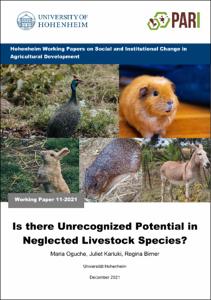Oguche, Maria; Kariuki, Juliet; Birner, Regina: Is there Unrecognized Potential in Neglected Livestock Species?. Hohenheim: University of Hohenheim, 2021. In: Hohenheim Working Papers on Social and Institutional Change in Agricultural Development, 11-2021.
Online-Ausgabe in bonndoc: https://hdl.handle.net/20.500.11811/10894
Online-Ausgabe in bonndoc: https://hdl.handle.net/20.500.11811/10894
@techreport{handle:20.500.11811/10894,
author = {{Maria Oguche} and {Juliet Kariuki} and {Regina Birner}},
title = {Is there Unrecognized Potential in Neglected Livestock Species?},
publisher = {University of Hohenheim},
year = 2021,
month = dec,
series = {Hohenheim Working Papers on Social and Institutional Change in Agricultural Development},
volume = 11-2021,
note = {Population growth and changing consumption patterns have resulted in an increasing demand for animal protein, especially in Sub-Saharan Africa (SSA). In meeting this demand, efforts have been geared towards intensifying the production of conventional livestock species, namely cattle, sheep, and goats, as well as pigs and poultry. However, trade-offs that negatively impact the environment, human nutrition, gender relations and other socio-economic dimensions are associated with increased conventional livestock production. These negative trade-offs make it expedient to explore the production potentials of other livestock species, which have been neglected. Drawing parallels with neglected or “orphan” crops which have attracted increased research attention in recent years, there are still major knowledge gaps on the role that neglected livestock species could play in improving the sustainability of livestock production in SSA. To address these knowledge gaps, we present a systematic review of the literature on five neglected species, which could play a larger role in SSA: grasscutter, guinea fowl, guinea pig, rabbit, and donkey. Applying the checklist for “Preferred Reporting Items for Systematic Review and Meta-Analysis” (PRISMA) and using Boolean search operators for relevant terms in academic search engines, 128 studies were selected for this review. Criteria used to filter the search items included year of publication, Africa-centric reports, and a specific focus on the selected species. The results show that the opportunities for promoting neglected livestock species include their nutritional importance (high quality protein, low fat, high dressing percentage), high economic gross returns, environmental sustainability, and importance for women’s empowerment. However, the results also show considerable barriers including production challenges such as feed and nutrition as well as diseases and pests; institutional problems, such as exclusion from policies and development strategies, lack of research and extension, unavailability of credit facilities, inadequate markets, and animal welfare issues. We conclude that there are often fewer negative trade-offs in the production of these neglected categories of livestock than in the production of conventional livestock species. This study derives four policy recommendations to promote the improved production of neglected livestock species, namely: (1) institutional and policy inclusion; (2) research, development and genetic improvement; (3) awareness creation; and (4) strengthened value chains. If systematically implemented, these policy instruments could enhance the sustainable adoption of - and benefits from - these livestock for non-farm families, children, men and women farmers. Our review shows that neglected livestock species offer a high and largely unexploited economic and nutritional potential, which could yield considerable benefits in the future if given attention.},
url = {https://hdl.handle.net/20.500.11811/10894}
}
author = {{Maria Oguche} and {Juliet Kariuki} and {Regina Birner}},
title = {Is there Unrecognized Potential in Neglected Livestock Species?},
publisher = {University of Hohenheim},
year = 2021,
month = dec,
series = {Hohenheim Working Papers on Social and Institutional Change in Agricultural Development},
volume = 11-2021,
note = {Population growth and changing consumption patterns have resulted in an increasing demand for animal protein, especially in Sub-Saharan Africa (SSA). In meeting this demand, efforts have been geared towards intensifying the production of conventional livestock species, namely cattle, sheep, and goats, as well as pigs and poultry. However, trade-offs that negatively impact the environment, human nutrition, gender relations and other socio-economic dimensions are associated with increased conventional livestock production. These negative trade-offs make it expedient to explore the production potentials of other livestock species, which have been neglected. Drawing parallels with neglected or “orphan” crops which have attracted increased research attention in recent years, there are still major knowledge gaps on the role that neglected livestock species could play in improving the sustainability of livestock production in SSA. To address these knowledge gaps, we present a systematic review of the literature on five neglected species, which could play a larger role in SSA: grasscutter, guinea fowl, guinea pig, rabbit, and donkey. Applying the checklist for “Preferred Reporting Items for Systematic Review and Meta-Analysis” (PRISMA) and using Boolean search operators for relevant terms in academic search engines, 128 studies were selected for this review. Criteria used to filter the search items included year of publication, Africa-centric reports, and a specific focus on the selected species. The results show that the opportunities for promoting neglected livestock species include their nutritional importance (high quality protein, low fat, high dressing percentage), high economic gross returns, environmental sustainability, and importance for women’s empowerment. However, the results also show considerable barriers including production challenges such as feed and nutrition as well as diseases and pests; institutional problems, such as exclusion from policies and development strategies, lack of research and extension, unavailability of credit facilities, inadequate markets, and animal welfare issues. We conclude that there are often fewer negative trade-offs in the production of these neglected categories of livestock than in the production of conventional livestock species. This study derives four policy recommendations to promote the improved production of neglected livestock species, namely: (1) institutional and policy inclusion; (2) research, development and genetic improvement; (3) awareness creation; and (4) strengthened value chains. If systematically implemented, these policy instruments could enhance the sustainable adoption of - and benefits from - these livestock for non-farm families, children, men and women farmers. Our review shows that neglected livestock species offer a high and largely unexploited economic and nutritional potential, which could yield considerable benefits in the future if given attention.},
url = {https://hdl.handle.net/20.500.11811/10894}
}






